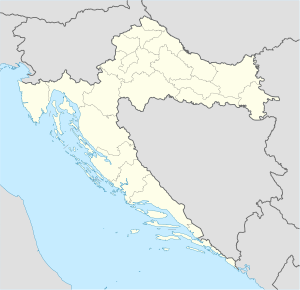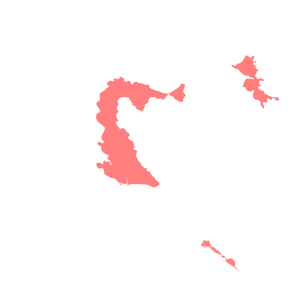| Korana bridge killings | |
|---|---|
| Part of the Croatian War of Independence and the Yugoslav Wars | |
Karlovac on the map of Croatia; JNA/SAO Krajina-held areas in late 1991 are highlighted in red | |
| Location | Korana bridge, Karlovac, Croatia |
| Date | 21 September 1991 |
| Target | Yugoslav People's Army reservists |
Attack type | Mass shooting, summary executions |
| Deaths | 13 |
| Injured | 2 |
| Convicted | Mihajlo Hrastov (4 years' imprisonment) |
Thirteen Yugoslav People's Army prisoners of war were extrajudicially killed at the Korana bridge in Karlovac, Croatia on 21 September 1991, during the Croatian War of Independence. Four others survived the massacre, two of whom sustained injuries.
Croatian Police officer Mihajlo Hrastov was arrested by the Croatian authorities in March 1992 and charged with the murders, but was acquitted at his subsequent trial. The Supreme Court of Croatia soon ordered a retrial, but no legal proceedings were initiated against him for the duration of the war. On 7 July 1995, Hrastov was awarded the Order of Nikola Šubić Zrinski by Croatian president Franjo Tuđman, and in April 1996, was named an honorary citizen of Karlovac. During the 2000s and early 2010s, Hrastov was retried multiple times by the Croatian judiciary before finally being sentenced to four years' imprisonment by the Supreme Court in 2012. In May 2015, the Supreme Court upheld Hrastov's four-year sentence. The length of Hrastov's sentence was criticized by several human rights advocates and non-governmental organizations. Also criticized was the Supreme Court's decision not to explicitly describe the killings as a war crime in its ruling or take into account witness testimony which suggested Hrastov was not the sole perpetrator.
Events commemorating the victims have caused substantial controversy within Karlovac and have been disrupted multiple times by Croatian war veterans. At a war veterans' event in 2021, Croatian president Zoran Milanović made comments that were widely perceived as being supportive of Hrastov. Later that year, on the thirtieth anniversary of the massacre, the Karlovac town council voted to name the bridge where the killings took place after Hrastov's special police unit. At a ceremony held later that day, a mural of Hrastov was unveiled next to the bridge.

